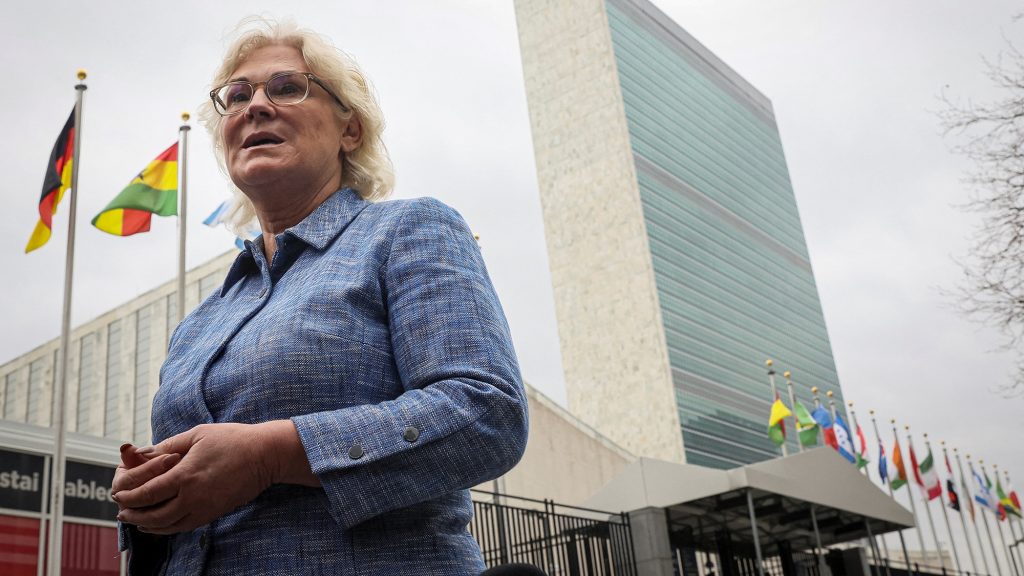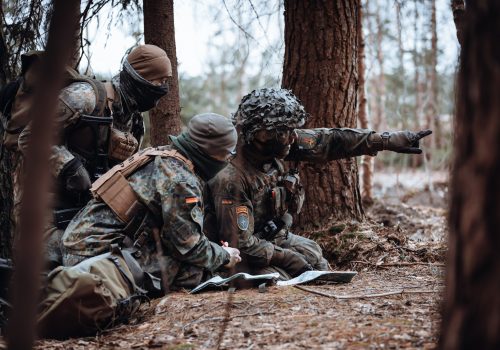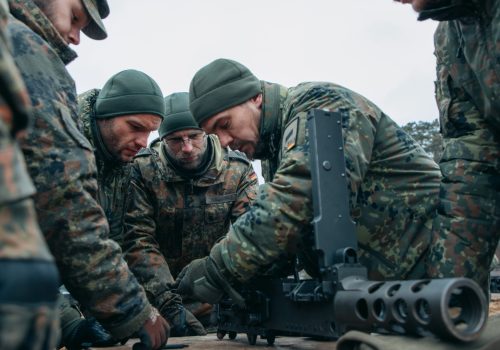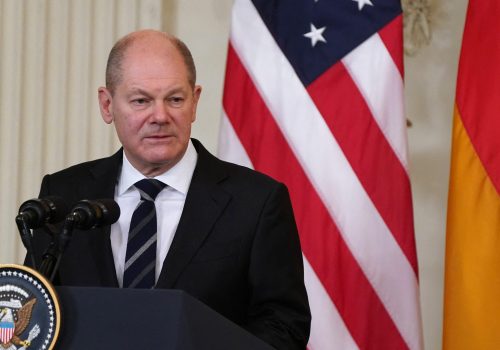Watch the full event
Germany is committed to step up in global efforts to support Ukraine in its fight against Russia, German Minister of Defense Christine Lambrecht said at an Atlantic Council Front Page event Tuesday, as the conflict has provoked a broader reckoning about the country’s place in the world.
A historic turnaround in Germany’s foreign policy has garnered widespread support among the German public, she said. “We cannot look away or stand apart,” said Lambrecht during her first visit to Washington since taking up her post in December. “A turning point does not come for free.”
Just days after Russia invaded Ukraine, German Chancellor Olaf Scholz pledged a one-hundred-billion-euro cash boost to breathe new life into the country’s military, along with a new commitment to devote 2 percent of Germany’s gross domestic product to defense spending going forward.
Even though Germany plans to give a massive boost to military spending, diplomacy still comes first, she said: “Our first choice will always be dialogue, an attempt at understanding.”
Here are some more highlights from the defense minister’s conversation with Wall Street Journal reporter Vivian Salama, including what a reinvigorated German military might mean for European and transatlantic cooperation.
German-US partnership
- Lambrecht applauded US President Joe Biden’s efforts to stymie Russian President Vladimir Putin’s ambitions in Ukraine. “The leadership that President Biden and his team displayed under extreme pressure has been exemplary,” she said. “It has united the West, it has united NATO, and it has also united Europe. All attempts by Putin to divide the West have failed.”
- The United States remains a European power, Lambrecht said—and that’s good for both the United States and Europe, given how their security is interdependent.
- She noted that Germany is reaffirming its contribution to NATO nuclear sharing, in which Germany shares responsibility for US nuclear weapons based on its territory. Plans to replace Germany’s fleet of Tornado fighter jets with American F-35s will keep that part of the deterrent credible, Lambrecht said.
- “It is our job to show American citizens, American taxpayers, how much we appreciate American commitment by adding our euro to their dollars,” she said, referring to Germany’s plans to invest afresh in its military capabilities. That is “practical proof our alliance is alive,” Lambrecht said.
Ukraine peace talks
- It’s “impressive” for Ukraine to be in peace talks with Russia in Turkey, and while “this pain and suffering has to end very quickly” it is important to support those negotiations without influencing them, Lambrecht said.
- “The idea of the war ending quickly must not result in us making demands on Ukraine,” she said. “We cannot do that. It is purely the decision of Ukraine itself to decide what arrangements they’re willing to accept.”
China and beyond
- Lambrecht pointed out how the West’s reaction to Russia’s invasion of Ukraine has a far-reaching impact worldwide. “It is being closely followed by Beijing, Tehran, and Pyongyang as to how we respond to Russia’s aggression,” she said. “In all these cities, people have understood that the West is not at loggerheads, or weak, or helpless as people had assumed, or even hoped.”
- “In [the] Indo-Pacific we have to represent our values together, we have to defend our values,” she added. “We can’t believe that it’s far away and has nothing to do with Europe. That would be a wrong approach.”
Action in Europe
- Germany responded to a request from Ukraine for helmets back in January because, at that point, Berlin still hoped a war could be prevented and no decision had been made on providing weapons, Lambrecht said. (The supply of helmets was controversial, with Kyiv mayor Vitali Klitschko calling it a “joke,” Reuters reported at the time.) “It might have been naïve, but at that point in time we still hoped to be successful, to avoid this brutal war in Europe,” Lambrecht said.
- There are now “secure means” of delivering weapons from Germany into Ukraine, Lambrecht explained, adding that it was not possible to be specific because doing so could endanger personnel on the ground.
- Germany will make a large contribution to NATO by sending fifteen thousand troops to support the eastern flank next year, she said.
Brian McGee is a London-based writer, editor, and content producer.
Watch the full event
Further reading
Tue, Mar 29, 2022
What the Baltic presidents want the West to do now against Russia
Event Recap By
Estonian President Alar Karis, Latvian President Egils Levits, and Lithuanian President Gitanas Nausėda, proposed a number of options to counter Russian aggression at an Atlantic Council Front Page event Tuesday.
Tue, Mar 1, 2022
Will Germany’s geopolitical awakening last?
New Atlanticist By
For Germany’s new government, Russia’s invasion of Ukraine is a geopolitical baptism by fire.
Wed, Feb 9, 2022
Will Germany’s new leader be reliable enough for Washington?
New Atlanticist By Rachel Rizzo
Chancellor Olaf Scholz must recommit Germany to the transatlantic alliance. That's no easy task.
Image: German Defense Minister Christine Lambrecht speaks to the press following a meeting with United Nations Secretary-General Antonio Guterres, outside the United Nations Headquarters in New York, U.S., March 31, 2022. REUTERS/Brendan McDermid




